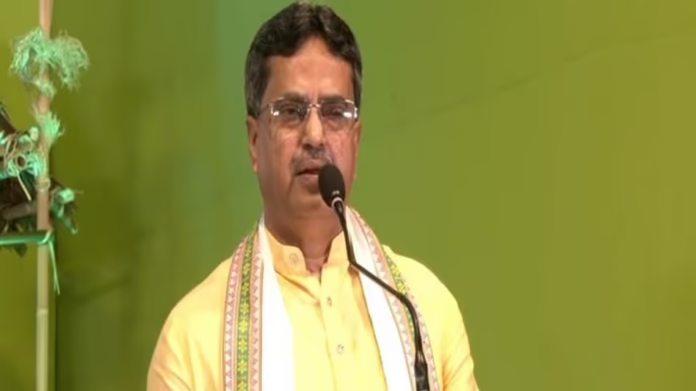Tripura has taken a bold stride in educational reform by hosting the Saharsh Utsav across schools in the state. On May 7, classrooms echoed with excitement and curiosity as students and teachers participated in activities under the Social Emotional Learning (SEL) framework. The Department of School Education led this unique initiative, reinforcing the state’s commitment to holistic education that nurtures not just academic excellence but also emotional intelligence and well-being.
Chief Minister Prof. Dr. Manik Saha praised the initiative and said emotional education empowers students to manage stress, make responsible decisions, and build healthy relationships. “We are shaping resilient citizens of tomorrow, not just exam-takers,” he said. The Chief Minister added that Tripura’s educational progress will accelerate as teachers and students engage in emotionally enriching practices.
More than 4 lakh students participated in the Saharsh Utsav, with over 23,000 teachers trained to implement Social Emotional Learning tools in classrooms. Schools conducted storytelling sessions, group activities, interactive games, and discussions focused on self-awareness, empathy, communication, and emotional regulation.
The Directorate of Secondary Education introduced the Saharsh initiative in 2022, inspired by national and international frameworks promoting emotional health among students. The Utsav serves as a platform to evaluate and celebrate the program’s impact. In schools across Agartala, Khowai, Gomati, and Dhalai, teachers reported improved student behavior, better classroom cooperation, and reduced disciplinary incidents since the program’s inception.
The Education Minister highlighted that traditional academic systems often overlook emotional development, which is critical for lifelong success. He reiterated that Saharsh Utsav stands as a turning point in redefining how education systems support young learners.
Saharsh Utsav has also empowered teachers by equipping them with tools to create emotionally safe and inclusive environments. Teacher workshops included role-playing exercises, conflict resolution strategies, and guidance on handling trauma among students. Many educators said they feel more confident in supporting not only academic growth but also the emotional journeys of their pupils.
In schools where students come from marginalized or economically disadvantaged backgrounds, the emotional learning model has had an even more profound impact. Teachers shared stories of children becoming more expressive, supportive of peers, and enthusiastic about attending school. These behavioral changes, they believe, stem from feeling seen, heard, and understood in a space that values emotions as much as intellect.
To maintain momentum, the government will establish a monitoring system to track the effectiveness of SEL strategies and offer continuous support through teacher mentoring and parental engagement. Plans are also underway to integrate Saharsh modules into teacher training institutes, ensuring emotional learning becomes a cornerstone of education in Tripura.
Several education experts from other northeastern states attended the Saharsh Utsav events and praised Tripura for its pioneering role. They suggested replicating the model in their own states, acknowledging that emotional well-being lays the foundation for creative thinking, civic responsibility, and academic motivation.
Students, too, responded positively. Many shared that for the first time, they feel their emotions matter in school. A student from a government school in West Tripura said she feels more confident and less anxious about exams or speaking in front of her classmates. “Now I know how to calm myself and help others,” she said.
Parents, who were also invited to witness the activities, appreciated the shift from rote learning to a more compassionate, understanding-based system. Some expressed hope that this focus on emotional health would reduce dropout rates and make education more meaningful for children across Tripura.
By championing Saharsh Utsav, Tripura is setting a national example of how education must evolve to include emotional literacy. In a rapidly changing world, the state’s leadership recognizes that academic knowledge alone is not enough. With emotional learning at its core, Tripura’s classrooms are preparing students to become thoughtful, empathetic, and emotionally intelligent leaders of tomorrow.


